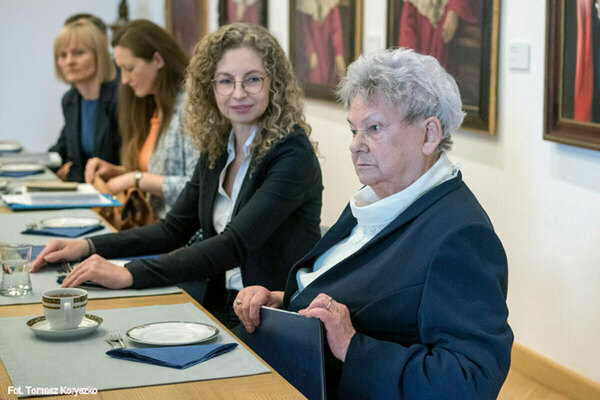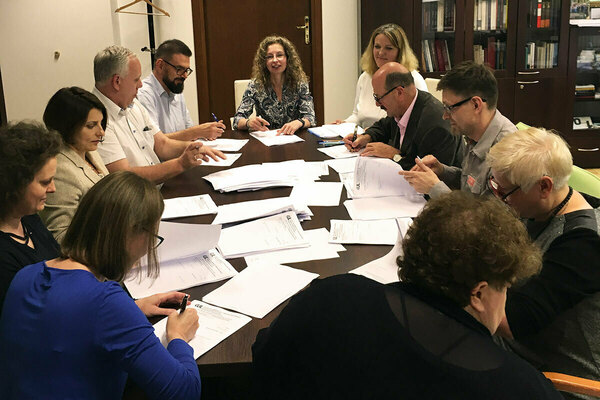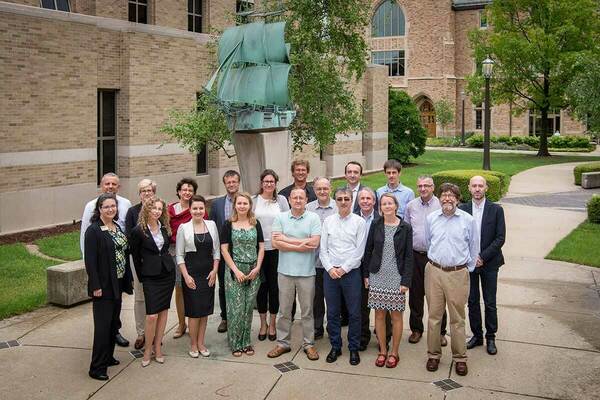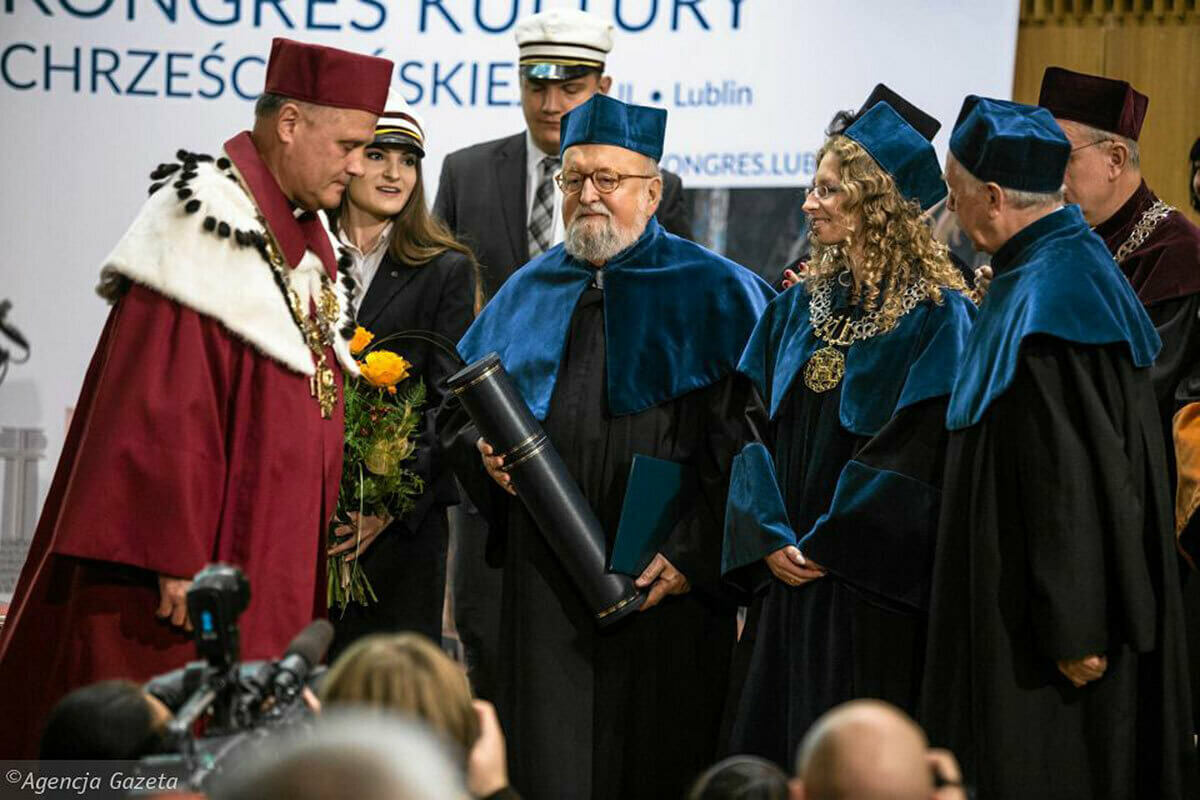
Magdalena Charzyńska-Wójcik is associate professor and chair of the Department of History of English and Translation Studies at the John Paull II Catholic University of Lublin, Poland. From 2016 to 2021, she served as Dean of the Faculty of Humanities. Charzyńska-Wójcik was a visiting scholar at the Nanovic Institute for European Studies in fall 2021 and participated in the Institute’s Catholic Leadership Program in summer 2017 and the 2022 Advanced Leadership Program in Rome. She currently serves as an affiliated scholar of the Nanovic Institute.
I recently stepped down after five years as Dean of the College of Humanities at the fourth oldest university in Poland. This period was as rewarding as it was demanding. I oversaw a faculty of well over 270 researchers, 20 administrative staff members, over 2,000 students, and almost 30 teaching programs. Now, almost 12 months later, three of which I spent as a visiting scholar at the Nanovic Institute for European Studies at the University of Notre Dame, I think I have enough perspective to look back and offer some reflections.

I had a great team: my Vice Deans offered me constant support, showed me trust and unwavering loyalty, and generously gave of their talents, creativity, and time. Somewhere along the way, the professional relationships grew into genuine friendships. So, I had the privilege of working with friends. The synergy was unique and it produced tangible results. During our leadership, the academic category of the College went up to the highest level, according to an evaluation carried out every four years on academic institutes in Poland, a categorization that has important consequences for research and teaching programs. There were other measures of success: the number of promotions and distinctions of the faculty members exceeded the rates recorded in the preceding years, we opened new teaching programs, and we forged new partnerships. My team was re-elected with support from 90% of the voting faculty (in Poland, deans are elected to their position).
What more can a dean ask for? I admit: nothing. But I also acknowledge that for this synergy to emerge and be sustainable a leader must assume sole responsibility for everything that goes wrong, while, at the same time, sharing every success with your team members. You must do so genuinely, through and through, outside of discourse or declarations. This was my daily beacon. It did not make my choices easier but it certainly made me confident that I was making the best decision possible.

I fully conceptualized and internalized this attitude after my first year as dean when I participated in the 2017 Catholic Leadership Institute, a summer program organized by the Nanovic Institute. Many of the meetings, lectures, and workshops left a lasting impression on me and provided useful tools for my work. The thing that mattered to me most was when one speaker articulated a feeling that had been growing within me and which I felt I should suppress for fear that it ran counter to any sense of team spirit. The speaker admitted, “at the end of the day, the president, dean, or director is all alone, no matter how good their team is. And it is then that you must face the weight of your decisions.”
After hearing my concerns articulated in this way, I felt that everything fell into place. I unleashed the feeling and embraced solitude as company for my daily (or, rather, nightly) ruminations. I walked through my choices and examined them not only for their expected outcomes but also — most importantly — for the genuine, well-intentioned motivation behind every decision. Projected results are predictions based on sound analyses of facts and an examination of the available options. At the same time, there is always a margin of error and the future does not always bring what we expect and hope for. There are developments we have no control over and they can adversely affect the most carefully premeditated decisions.
In contrast, we do retain control over our intentions. They are facts, even if known only to us, but they are nonetheless important. That is why I always focused on intentions: what we ultimately want to achieve and why. This what and why goes far beyond the horizon of the choice at hand. It is the bigger plan, the deeper machinery of our daily work. My quotidian decision-making mantra was: “Do we want the result for a good reason?” and “Have we done all we could to make the best decision?”

As I grew into my role as dean, I learned to factor in motivation at the beginning of any analysis or decision-making process. No matter how odd, trivial, or irrelevant it might seem, and regardless of the potential reactions of the group I was working with at the time. For example, on one occasion, I was a member of a committee tasked with deciding how to deal with a situation in which a university professor had offended academic standards. One member of the committee suggested that if we applied the strictest possible penalty, it would act as a deterrent for future offenders and thus would perform a double function. I objected to this, arguing that the measure applied should only be based on that person’s actions. Any decision on how to discipline this individual, I believed, should not be influenced by hypothetical future scenarios. In the end, the committee decided that this person’s actions alone did deserve the strictest measure. We, therefore, reached a unanimous decision, one that was made for good reason.
In scenarios like this, I felt empowered by what I heard in Notre Dame, which made me accept and embrace sole responsibility for whatever I had influence over, while also inviting and welcoming the help and support of my friends, colleagues, and advisers. The responsibility was mine no matter whose advice I followed. It started from the intention, extended through the decision-making process, and ended with the outcome. This way, the final result, though very important, was not the sole measure of the value of our daily endeavors: whatever happened had an element of good in it because the intention was good. The Catholic Leadership Program helped me to not just internalize this perspective; it made it my creed.
Originally published by at crossingthesquare.nd.edu on August 15, 2022.